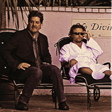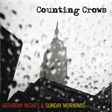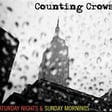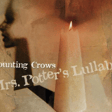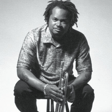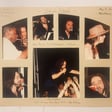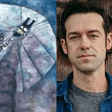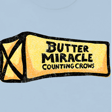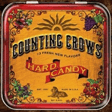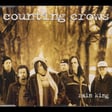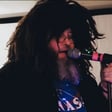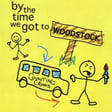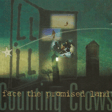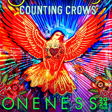Become a Creator today!Start creating today - Share your story with the world!
Start for free
00:00:00
00:00:01

E35: Steve Bowman Interview
Steve Bowman is one of the founding members of Counting Crows.
He played in the band from 1991-1994 and was the drummer on August and Everything After.
Join us for this special episode; as Steve reflects on his time with the band.
Steve's Facebook:
https://www.facebook.com/steve.bowman.946/
Steve's Podcast:
https://open.spotify.com/show/5cpCa4p8ge0eSPzI8WsEJR
Steve's Music Lab:
Transcript
Introduction and Guest Introduction
00:00:18
Speaker
Welcome to the Sullivan Street Podcast. I am Eric Vogelsang with my co-host Chris Miggs. And boy, another special treat today as we have one of the original founding members of Counting Crows, Steve Bowman. But before we say hi to him, I'll just say a quick hello to Chris. Chris, what do you think?
00:00:35
Speaker
Another exciting day, huh? I'm i'm excited. let's let's get Let's get into this. Let's talk about... ah Let's talk about crows. There's only five original members. So each one is, is, is, uh, you know, it's a pleasure to speak to. So Steve, uh, good afternoon. Thanks so
Early Career and Formation of Counting Crows
00:00:48
Speaker
much for joining us on the podcast.
00:00:49
Speaker
Well, pleasure. Thanks for inviting me ah so let's, um, let's start real, uh, easy. And, um, I guess we'll go from the beginning. oh or do you i guess we'll do the beginning first, Chris. I was also going to say what he did post-Crosse, but let's do the beginning.
00:01:04
Speaker
I guess you know if you look on Wikipedia, et cetera, it says, oh, you joined the band 91 and left 94. So we have three years in there. We know that there's a Bay Area connection to everyone.
00:01:15
Speaker
In a recent interview, Adam, I think, mentioned that your connection to the band, like, for example, we know Matt was connected with Dave, right, et cetera. Your connection was you were in a different band downstairs from where they were practicing. Is that correct? or do you want to talk about that? Yes.
00:01:31
Speaker
But I would say my connection was through Dave. Okay. I almost forgot that I was rehearsing in a band, ah in the same warehouse ah that Dancing Dog Studio was housed in. Dancing Dog was Dave's 16 track, two inch studio in Emeryville, California.
00:01:53
Speaker
And it was a beautiful little place. And um my band recorded a record there. And that's how I met Dave. And ah then after that, he would call me back to do other things.
00:02:07
Speaker
um One of the things I was good at was playing with a click. I had worked a lot on, think think do you know, so not many people had done that. And as a drummer in my early 20s, it was a lucky break because then if a drummer was doing a session at Dancing Dog and they couldn't keep to the click,
00:02:29
Speaker
Dave would call me in ah So that was my relationship with Dave at that point. So you were in a band and you recorded there and you met him because he was working there.
00:02:41
Speaker
Yeah. What's that? Did you know any of the band members from either, like maybe not personally, but seeing them at a club something like that before then, do you think? Or not really? No, it's funny.
00:02:53
Speaker
I didn't. And it surprises me because I should have. We were all kind of working in the same club scene, but I was in a really different um facet of it. i was I was in like more, we were doing like, it just come out of the 80s and I was doing like funk stuff, you know? i um um Like I wanted to be the drummer in level 42, you know? Right, right.
00:03:22
Speaker
Music school nerd stuff. and And I knew Dave because i had heard his band, Mr. Dog, and they were amazing.
00:03:33
Speaker
And ah they had a song called We're Only Love, I think it was, that I got a recording of and listened to just over and over again. again. So when i worked with Dave, I, I remember thinking at that time, i would love to do something with Dave. I love his sensibilities. I love his musicality.
00:03:53
Speaker
And I was kind of wimpy for the ah band I was in at that point. um
Joining Counting Crows and Initial Success
00:03:58
Speaker
And so I thought Dave would be more in line with my, yeah ah what I was interested in and who I was.
00:04:08
Speaker
And so It was, a I don't know, a few, at some point Dave called me and said that he wanted to put a, he had a an idea, he had a friend, they were going to put a band together. And I was like, oh, this is it.
00:04:20
Speaker
So he gave me a demo tape then. i guess you, a lot of those songs you guys know, and then we recorded more and that became the demo that got the band signed. But when I first heard those songs, it was just cemented for me. It's like, all right,
00:04:37
Speaker
I love these songs and I want to play in a band with Dave. So ah that was how that started. I met Matt then, who was the bassist in ah Mr. Dog, although I'd never met him and ah met Adam. and I'd never met Adam. I'd never heard of the Himalayans. It was a completely different scene.
00:04:58
Speaker
um And then Charlie too, whom I'm surprised I hadn't met because he was a real prominent keyboardist in the area and I was trying to be a prominent drummer in the area, but ah we hadn't met.
00:05:12
Speaker
Do you know if, um like, so Dave knew you and maybe you had Dave's recommendation, like, hey, Adam, you know, this Steve's a great drummer. you know if you had to compete against other drummers or did they look at seven different ones and then chose the best? And what would you think? it if so...
00:05:27
Speaker
What do you think you brought that that helped them select you? Well, I'm really lucky in that it wasn't that type of thing. um Adam and Dave had ah ah had decided to put a band together and Dave called me. He ran into Matt, as I found out on your podcast, I think. i And then.
00:05:51
Speaker
ah Charlie, I think they both knew, but it was more rather than, hey, there's 10 people coming down today. It was, let's play some music and see how it feels. And it just was really great from the start.
00:06:05
Speaker
I loved the songs. And so I listened to those. um I listened to the songs and really, ah i i knew them. you know I knew the tempos and changes because I'd been listening to them lot. And so when I got there, it wasn't me having to like,
00:06:20
Speaker
play off notes or try and remember what was happening next. I just dance into these songs I knew. And so as a drummer, that's a great benefit I had. ah And, and we all got along real well.
00:06:33
Speaker
um We, there, the band was, ah they're kind of sophisticated. kind of I wish I'd been more so I wasn't as sophisticated, but um ah you know, you,
00:06:47
Speaker
the lyrics obviously ah i'd come from uh uh the
Steve's Musical Background and Education
00:06:52
Speaker
funk world you know it's like uh uh well it's more uh you're trying to generate feelings to the music than the lyrics right certainly maybe the lyrics weren't written by an english major at berkeley or whatever so um yeah yeah so Anyway, it it just ah that's how it all came together. I was telling someone on a different podcast that you may have seen that we recorded two weeks after that first meeting. We got together and we started of playing every day and it was great. And it was like, I couldn't wait to get to to the rehearsal at ah Adam's house and and play the songs and hang with these new guys I met that I thought were so cool. So that was how it started. um ah but That's fantastic.
00:07:37
Speaker
um How long was it before you started playing live after? Because I know, there's also so again, you guys were a recording band before you even like played a live show. But what what's like the gap from, OK, we went and recorded the demo and now it's like maybe we should start playing some shows?
00:07:50
Speaker
Oh, it was quick. I mean, we we started immediately playing little shows that nobody came to. Yeah. playing small venues and, and ah hoping sending out mailing list stuff that, that ah people had and hoping we could get a hundred people and then 150. And we did ah had an article come out in the local um what was the pink section of the Chronicle.
00:08:20
Speaker
and This all sounds like, you know, antiquated stuff, but ah it was actually ah something that, we were on the cover of the pink section and that was seen by everybody. And so we played a show after that came out and there's a line around the block. And I think Matt told that story because we'd all gone to get pizza and we were walking and there's this huge line going down the street and we're just like, who's playing there? mean, we really didn't know was for
00:08:55
Speaker
And we were kind of thinking, oh, man, some other band is doing well tonight. I mean, it's amazing. That was how we discovered that ah the pink section had kind of helped us out. Because after that, it was always packed, you know.
00:09:10
Speaker
so And in small venues, I mean, you know. Yeah. Right. But in the clubs, right? I mean, it's a big, it's a full a full club show, you know, which is meaningful when you guys are just in a club band at that point, you know?
00:09:21
Speaker
Yeah. Yeah. So it sounds like you, um, what you, at least your memory that there was like, of course, like kind of a pre demo tape maybe of, of Dave and Adam workshopping songs or recording some early stuff, but then, but the actual demo demo that got sent to the record companies that had a bidding war, you you were, i guess on most of, or all of those songs I'm assuming.
00:09:40
Speaker
No, um, I would have been on the ones we recorded that day. And I think we recorded some more later, but yeah. Um, I can't remember what we did that day. Although that,
00:09:52
Speaker
that Some of the stuff like Einstein on the Beach was, you know, was it? That lyn was you at day, two weeks in. Yeah. And I can't remember what else. um but ah But then we added to it, I think, and and it was a long demo. It was like 13 songs. It wasn't something like that. Toby Hawkins did a lot of those. He was an original, ah played with them, and Lydia Hawley played keyboards, and Marty Jones, Mr. Jones, played bass. Right.
00:10:21
Speaker
For a while, they did that. I don't know they ever played any shows, but they did some recording. One of the benefits was that Dave had this beautiful studio and every time we had a new song, we'd just pop on over and knock it out, you know? yeah And he had a great ear. He was very talented producer engineer. Um,
00:10:43
Speaker
So ah so what a benefit for a band to not have to worry about how are we going to record? You know, who's got some money, you know, that's a major expense.
00:10:54
Speaker
Yeah, that's that's what I have heard, too, that that that Dave having that engineer. I mean, what how many bands in their early twenty s that are just starting have someone with like engineering mixing experience that doesn't happen much? At their disposal.
00:11:08
Speaker
At a time when demo tapes ah were pretty, well, a demo tape was how you got heard, you know? Mm-hmm. so Can you paint us a picture of Dancing Dog? Because I've always kind of, I don't know, we hear about it a lot. And I'm just trying to imagine it like this studio that this indie musician has, I guess with rehearsal rooms around it as well. But just sort of like, what was it like? Where where was it situated? just try i'm I'm just kind of curious of like where, like what that looked like. Well, it was a huge warehouse in Emeryville and the warehouse was chopped into different, uh, size, uh, uh, places for people to work live workspace.
00:11:51
Speaker
And there were, uh, you know, uh, kind of
Life Before Fame and Success with Counting Crows
00:11:55
Speaker
freaky skateboarders and ah musicians and ah serious woodworkers and iron work, you know, all different types of folks.
00:12:05
Speaker
A lot of people lived there because you just go inside this big open um hole and build whatever you want. And so that's what Dave did. Dave probably had, I mean, it wasn't big.
00:12:19
Speaker
ah He probably had I'm going to just guess and say it was 60 feet by 20 feet. And so he, in there, he built a small recording, a tracking room.
00:12:33
Speaker
And next to that was the booth with the board in it. And I mean, like once you got the board in there and built it in, That's it. It's this type of thing where the board is bigger than the door.
00:12:48
Speaker
And, and then there was, uh, uh, you would go, ah there was double doors and then you'd go, and it was a flat out warehouse waiting room, a cement floor, ceilings are 30 feet high, big, dirty windows, but funky and cool, you know, and, uh, there was a couch and a place for, uh, you know, to listen to music, you know, but honestlyly super small.
00:13:12
Speaker
um It was 16 track, two inch reel to reel recording, you know, and Dave could flip the tape over and, and create, record things on the other side, which he did for a couple of songs. And, and like, if, if there was a problem, Dave could get in there and snip it out with his.
00:13:36
Speaker
yeah The splicer, right? Yeah. they attach the tape So, I mean, forgotten arts. Yeah, I remember I even did a little bit of that when I was doing wrestling radio stuff early. So, of course, I have all so many Crows fans, but I guess, and I don't know if I should have, ah ah sorry, Crows questions, but i i maybe I should have started, but I kind of wanted to get right into you joining a little bit about your bio, because I do think it's a neat story, and this is a good place to tell it, that and I think you've said another podcast, and then you can fill in the blank now, something I think your parents bought you a drum set when you were five or something, and you fell in love there,
00:14:09
Speaker
And then I kind of heard that you were in some bands later and played at an amusement park and when you were 18 or 19. But but like you know what about the time in between? And did you when you were in junior high and high school, did you think, hey, I'm going to do this as a career? And then you just mentioned something I think about.
00:14:25
Speaker
music school, so I don't know anything about that, so please. yeah I like to say I fell in love with the first drum set I ever saw. and i was about five years old, and I was just captivated by the look and sound of drums. and and i think i I feel so lucky for that because ah You know, having had kids of my own, I know now that like really the greatest thing for them is to have a passion no matter what it is. And and at five years old, I really ah i loved baseball. I loved, you know, other things, but G.I. Joe, whatever I did. But.
00:15:00
Speaker
But drumming and and everything about it captivated me very early. And um by the time I was in junior high school and had discovered that there was such a thing as a rock star, you know,
00:15:15
Speaker
ah By that point, I was already pretty sure that if that was a possibility, I wanted like to try doing it. And, you know, through no credit of my own, I was very confident.
00:15:27
Speaker
I don't know why. um i mean, I, you know, i I was pretty natural at drumming, but... You know, I wasn't, ah you know, some kid phenom or anything.
00:15:38
Speaker
And yet I really felt like being a successful drummer was a perfectly logical thing to do. And... kind of felt like it was possible. I guess ah I kind of feel now in hindsight that lots of things in life are kind of possible if you believe it. Right. That's right. no um But because of an unexplained cockeyed enthusiasm and, and ah you know, confidence, you
00:16:10
Speaker
The whole thing kind of felt natural, exciting and wonderful, but but not like, wow, I can't believe it. you know ah The drummer for Simi Sonic wrote an amazing book.
00:16:21
Speaker
ah I don't know if you ever... oh yeah I've heard of this book, but I think I've actually read it. So You Want to Be a Rock and Roll Star, it's called. ah What's great about it is he's a super intelligent, great writer who kind of went through the same thing I did.
00:16:37
Speaker
and And I thought, man, I should write a book. As soon as I wrote read his, i was like, okay, got it. I couldn't do it that well. um But, but in his case, he was like, where were they? They were at some Ivy league school.
00:16:53
Speaker
And next thing you know, he's on, you know on the road. And so that would be kind of a fish out of water surprise type thing. For me, it was just, it all felt like the next step, you know, but,
00:17:08
Speaker
ah so So you did go in. So what about the music school that you went to at some point? Well, yeah, I ah I started going to there was ah a Chabot College. It was a community college ah about 20 miles from where I lived.
00:17:23
Speaker
And they had a music teacher there named Frank Samaras, who what I'd heard I'd heard was really amazing. And and ah and he really was. But the focus was big band jazz and stuff.
00:17:34
Speaker
and i really wasn't that passionate about it although it got me into reading better and playing listening and trying to fit in with a band and then the other thing music school does which is good and bad it and this wasn't a particularly music school it was the music department of regular community college but he was very good so it was kind of like music school but the blessing and curse of this is it as a young musician you come out uh well with better knowledge, with
Touring and Popularity Rise
00:18:05
Speaker
an overall ah better knowledge of music, but also there can be kind of a sniffy snooty thing about it too.
00:18:14
Speaker
You've been listening to a lot of Steely Dan and all of a sudden, you know, ah i don't know, you know where I'm heading. Yeah. um I was, uh, uh,
00:18:27
Speaker
That'll get us to the Mr. Jones story. Well, one question I had, and I guess I asked Matt this, but one thing that I think musicians don't talk about sometimes is that, so I know you were from the Bay, I think you're from Oakland originally, right?
00:18:41
Speaker
Yeah. From the Bay Area. i how you When you joined the band, you would have been, i don't even remember. Well, I was born in 67. You know, in 91?
00:18:50
Speaker
have a ninety one So we're 23. So 23 about. um So I guess you were like, were you working at the time or living at home or wrapping up college? I always find that interesting too, right? Because some people that your passion might take 40 hours a week. And then what are you doing for the other, you know, to get to pay the bills or whatever? It's a great question.
00:19:10
Speaker
Yeah. I had at the time i was living in San Francisco. i was going to SF State and ah playing, trying to play the music scene.
00:19:21
Speaker
I didn't want to be at SF State. and i I wanted it as something to fall back on. But I also felt like I didn't. I thought it was negative to even have a fallback. Right. please time um And I wasn't a good student.
00:19:37
Speaker
um So that's where I was. I was living with my buddy, Charlie Stockley on Terraval Ave in San Francisco, going to SF State and playing in the band.
00:19:49
Speaker
Everybody else was back in the East Bay and I had moved to San Francisco. and Well, when we got signed, they gave us each $26,000, Geffen that check,
00:20:01
Speaker
dgc and when i got that check I just couldn't go back to SF State. and at that point And of course, I lived on that for a year and a half. It was ah I mean, i I rode a bike and I ate burritos and shopped at secondhand stores and it was easy.
00:20:23
Speaker
But ah but
Challenges and Departure from the Band
00:20:24
Speaker
yeah, once that happened, it was kind of like no going back. I just I thought, thank goodness I don't have to. stay here another three years i don't know what i in a bit of trivia what were what was your major at fs state well it was going to be a bca department broadcast communications but only because know mean that's what the football players were doing i didn't even want to work hard enough to be in the music thing you know i just like uh so oh i get it i get it
00:20:57
Speaker
Oh, that's great. Chris, before we move on, do you have any other questions about, the you know, bio and pre-crows and about the time joining the heroes?
00:21:07
Speaker
I guess but it's interesting that it's like you're, this moment there, like a lot of people, it's like leaving a job, but you just this knew at that point, you're like, well, I've got, essentially, you've got the career, do have to finish college? You've got the career that you were looking for at that point.
00:21:23
Speaker
Well, I mean, you have... Or started, at the start the start of it. didn't have the career yet. had the You had the first step towards it, you know. Well, what I thought, the first step, yeah. In music, you never really know. I mean, when they gave us that, that could have been it, you know. So what I thought was, this is good.
00:21:41
Speaker
You take a nod? See ya. What I thought was, ah this gives me justification to not go to school for a while and I got a year and a half to, you know, figure it out.
00:21:53
Speaker
But I did. have I keep banging this table. It's probably rattling through. That's all right. High tech instruments. and I. I. It's what I wanted. And and what a break, you know.
00:22:08
Speaker
Also, I should say to me at that point, twenty six thousand dollars was twenty six million dollars because I had. Yeah. Had. ah more than one zero in my bank account. So it felt pretty good. What I think is interesting sometimes when I think about people's stories or whatever, interview someone is that, you know, if I was talking to you in your 20s, I would be thinking of it from my standpoint in my 20s, right? Like, ah oh, how can i pursue my dream? Or how could I have the confidence to do that?
00:22:36
Speaker
Now, I sometimes think from the parents' perspective. So when I hear your story, I'm sometimes thinking of how I think your parents, right, they bought you that set. and then all but And then you're like, oh, i want to be a drummer. And they're probably like, oh, okay, maybe. And then all of a sudden, you get that check.
00:22:49
Speaker
And they're like, wow, look at that. they I'm sure, you know, they were prouder. Oh, no. yeah yeah Yeah, I should say my parents were very supportive. And that is another thing that no credit to me. i had parents that um ah my mom sang in the SF Symphony Chorus and and my they were both ah interested in us.
00:23:12
Speaker
I have a twin brother who played bass, ah Mike. And so, ah yeah, my folks were all on board. And I had friends that didn't have that. It was hard for them to play enough to get good or to you know, they got no ah inspiration or backup. And so they faded out of it quickly. But you know, I had that luxury, so.
00:23:34
Speaker
right, great. Well, we can talk about some of the tracks from August and Everything After, which has sold to this, and now, I keep forgetting now how many million albums I've mentioned a couple times on the podcast, but it's a lot of millions. And it's, and it's, and it's still um selling as, as, as Steve knows, you mentioned on another podcast, right? You said, well, I still sometimes even get some royalties. It has sold a lot. Yeah, I'm grateful. I'm the luckiest drummer in Murfreesboro. Yeah.
00:23:59
Speaker
it still a lot of um yeah It looks million in the um and i know you know I'm trying to, for our listeners that haven't heard the interview, bring up some of the things that you brought up before, and you very modestly have said, well, other drummers could have done it. I just got lucky. It still would have been a popular album even without me.
00:24:18
Speaker
you know Maybe, maybe even maybe even probably, but I still want to give a lot of, um for someone who's not a drummer, ah give you a lot of i don't know accolades and praise to your performance. And and what I thought was...
00:24:33
Speaker
great or no, sorry, but I guess shed a light or made things clearer to me is when you said in an interview recently that one of the things
Post-Crows Career and Music Education
00:24:43
Speaker
you bring or that you say that maybe other drummers don't consciously think about is trying to get into the mood of the song when you're doing the drumming and really understand the mood of the song.
00:24:54
Speaker
And I felt that. And when I listened preparing for this interview, I noticed that quite a number of times. So I won't really want to compliment that. view on that and and chris can talk about particular performances i thought in particular the three that come to mind that i thought were fantastic maybe maybe be a fourth i'd had there is uh and and well i maybe five but anna begins in murder of one or where i thought your performance is really yeah got the mood of the song essentially because it kind of and it begins it's very subtle song and you know it changes a few times you have to do that
00:25:25
Speaker
um i I guess i one question I definitely want to ask you is ah was it your idea or T-Bones or whoever on Ghost Train, right? That it sounds like the train is going. um Interesting. Which is incredible.
00:25:41
Speaker
um ah so it it i I don't remember that coming up. That was like, ah what? ah um It wasn't an intention.
00:25:53
Speaker
But yeah it it happened. Oh, yeah. If you listen, it's sound like it it like it feels like that locomotive. bum but but Yeah, I can't explain it. But if you listen to Ghost, I think that's one of the that's why I love that song so much. One of it is that actual drum part in the you know with the bass and everything else, too.
00:26:09
Speaker
Yeah. yeah and that Is that what they call life imitating art? or is yeah something so Something like that. And actually, even Perfect Blue Buildings recently, I'll talk about the second, I saw a live thing where I could see you getting into the feel of the song with with the little touches of the brush, I guess it is, and stuff like that.
00:26:28
Speaker
Yeah. I know that you've contributed so much but to ah to all the songs that you record, except for maybe we'll talk about Mr. Jones. But um I guess writing credit wise, I guess the only official one you have is Time and Time Again. i didn't want to note that. I guess I guess you contributed more than the other songs. And I always get a little confused about how the writing credits work sometimes. Did you have any yeah so no any thought about that before we go to Chris?
00:26:51
Speaker
Sure. and And I can, I don't think it's any big secret how we broke up our royalties on that. It was pretty, uh, I thought, uh, astute and, benevolent on Adam's part.
00:27:04
Speaker
Uh, but with time and time again, it just happened that, uh, Matt Malley and I were jamming along with that and, uh, and everybody came in one by one. And, and so I think that's how that happened.
00:27:19
Speaker
Um, okay but, But what we did ah with the whole record was ah divided into three separate parts. So lyric and melody was a third.
00:27:33
Speaker
And then, so Adam got all that. uh deservedly so um and then a third was set out for music if you wrote the progression of the bridge or you had a big song change idea whatever and then the third third we divided between all of us for performance and it's the way that uh Oh, I can't remember who did it. It was a band in the 60s, 70s that did it that way that made a lot of sense to keep the band together because obviously if the drummer and bassist are like living with their folks and everybody else is shopping for homes, it can create resentment. so
00:28:18
Speaker
So this allowed um us to all be a part of the royalty ah ah thing. And yet it wasn't cut down the middle because, you know, I mean, a song like Round Here, I'm proud of the drumming, but obviously ah Adam ah created more that people would love about that song than I did.
00:28:41
Speaker
It only makes sense. um I heard that the guys in Green Day split their stuff down the middle, 33, 33, 33. And, and you know good for them ah but It seemed to be a good balance the way you described it. Well, if I were Billy Joe, at a certain point, I'd be like, hey, come on yeah
00:29:02
Speaker
on. Chris, I didn't mean to cut you off. There's only three of them, though. I feel like it's trickier. When when there's three of them, it's easier to be like, we're all going to share this, right? That's a kind of a... Everybody gets a bunch. Yeah, you're right. But that was our setup. And it and it has been... i mean, i say it's It's a wonderful gift to me because, um you know, i have a simple life in a small town in Tennessee, but I have an easy life. I don't have to, yeah i you know, it's not luxurious, but I don't have to work 40 hours a week and and worry about things happening. and And so I am so grateful for that. I can...
00:29:39
Speaker
I work with animals a couple of days a week. I ride my bike a lot. I just, I, I do simple, uh, wonderful things that I'm grateful for. And, uh, wouldn't be able to do that if I were, uh, digging ditches, which were was my fault. No, Chris, I know someone, uh, Steve Poltz, who was like a helped write, he's a musician, but you also in Nashville who had written with, um,
00:30:05
Speaker
jewel you were meant for me and they obviously a giant hit and he's like yeah writing that song was like uh it's like as a grant from it's just a it appears and now he just gets to keep doing his thing and it's ah ah a kind of a beautiful thing when you have like something that's that big it can kind of it's beautiful that that music industry from that least that time period can still allow you to sort of have some ability to live off that from all these years later you know yeah and being in a band in a lot of different bands, our goal always in recording a record was to be successful enough to be able to do another one, you know? Right, yeah. and
00:30:42
Speaker
Chris, did I um cut you off when I was talking about his performance on August in certain songs? Oh, no, i think you you nailed it, right, um Eric? I think, you know, Anna Begins, we should probably talk more about, because I think... No, it's great. Can you hear me okay?
00:30:56
Speaker
Yeah. No, you're good. um Just with Anna Begins, it was hitting me that, like, when you think about that song, like the drums are actually probably one of the first things that you think about.
00:31:08
Speaker
um And there's a, I'm curious if there was anything specific with that part. Cause it, it does that the drums and that really drive the song. Was there sort of a lot of intention on those or anything?
00:31:18
Speaker
And I guess maybe in general, if there's other songs you really specifically remember thinking about how those parts were going to play out, ah interested in that as well. Yeah. Well, and on that one in particular,
00:31:30
Speaker
Anna Begins, ah it originally started with a groove that Toby Hawkins had done, ah the original drummer. um They had recorded, and the demo version is him, if you heard the demo version.
00:31:46
Speaker
And so that's what I heard, ah which fit perfectly ah
Reunion with Drum Set and Reflections
00:31:51
Speaker
for my speedy little music school hands. but ah So I love things like that. I was i loved Manu Cachet and, and ah you know, I loved all these drummers that were ah um played ah groovy but could had chops, you know?
00:32:13
Speaker
A weakness of a young drummer. But there I was. um Anyway, I can't remember. um what was the What was I even talking about? What was the question? Anna Begins. Just your thought about Anna Begins. Yeah. yeah um The thing about Anna Begins is that I love the song so much.
00:32:29
Speaker
I love the song so much that I would forget I was a drummer. And just for like the idea to forget you're a drummer playing drums and just become reacting to this uh the inspiration of the music that's what i could do on on uh anna begins uh and because i power and passion and beauty and pain melancholy i mean right up my alley you know and it was everything i wanted to do as a drummer so that song in particular was one that i just loved being in and hearing and you know
00:33:12
Speaker
I saw and one more question maybe before we talk about Mr. Jones is that I i I know that the album had a certain feel of it. And, you know maybe in some cases, either the mix or you're playing had to be a little muted to fit in what you're trying to record. i And I say that particularly for Murder of One. I got to see one performance of that online. There's not a ton of concert footage on YouTube from you at that time. There's a Letterman performance. There's a, colog i think it's a Cologne, Germany. There's a Germany 1994 performance where you're there.
00:33:44
Speaker
And I could just see you having so much fun with Murder of One because you're allowed to... Give it the full throttle that couldn't be on the recorded version. And I know when Jim plays it, I see him going full throttle now too. They don't play that song so much anymore.
00:34:00
Speaker
But anyway, I just saw that last night and I saw you with a big smile on your faces here as you're clanging those drums. And it's such a great drum yeah drum part, many parts of that song. So yeah, anyway, that caught my attention. and At the end of the song, there's that fill where it's it's just 16 16th notes.
00:34:19
Speaker
Yeah. It's as hard as I could hit. Yeah. so Which was hard to do without. I ah sped that up early. And so I had to work on. you know, hitting it as hard as I could without speeding up. But I remember that being such a magical part of ah the live show for me, because normally it's like the last song and we've been wrong and you're sweaty. Yeah. And that part. And man, that was kind of like, we're heading home. And course,
00:34:52
Speaker
The audience would go crazy. and Yeah, they were especially at that point in their 20s, they were jumping and Adam was jumping around. yeah yeah no It was great because that's not going to happen as much now when you have you know a bunch of 60-year-olds drinking wine and sitting down. yeah You got to experience that really special time. and And of course, at that time, the Crow's catalog didn't have a lot of fast bangers where they have a lot more of those now.
00:35:16
Speaker
So that was, as you said, it was a great way to end the shows in the few times. Unfortunately, I didn't get to see you or um during that time. I, you know, I was a fan since the beginning. I guess I didn't become a super fan until later.
00:35:30
Speaker
So I almost don't have as many, almost was going to say this in the beginning. I almost don't have as many memories of you because right. You're on that album and then the next album you weren't. And then on the videos you are in Mr. Jones in the back.
00:35:42
Speaker
And, um, but around here, I noticed you're only on for like one second, right? You, is it, you're driving the car? Yeah. Yeah. You drive. It's either, I think it's you and Matt drive up, right? There's one part of around here that you and Matt drive up. Oh, and and Dan's in the back. Yeah.
00:35:57
Speaker
And so, because I watched that recently, because I was almost like, even though you're such an instrumental part of that, you, right, you know, of course, you know, you could see you on the performances at Letterman and Saturday Night Live. But yeah so I felt like I didn't really know you that well outside of your drumming. So this that's why this is a real pleasure.
00:36:14
Speaker
yeah So, ah yeah, yeah so so I guess one fun fact that came up, I guess recently I hadn't heard it before, Chris, and maybe you did it on the podcast, whatever that, that, that um even though Adam says round here is the song that made the band and the whole album sold well, but Mr. Jones is,
00:36:33
Speaker
arguably the biggest hit and still play it on the radio to this day. And that, that was the one song, I guess on the album, the recorded version that you did not play on. Did you, which is probably in a way kind of funny. Maybe if laugh in retrospect, did you want to talk, you know, if if you just let, you know, that that life is, life is silly, right? Life is, you know,
00:36:52
Speaker
That really, and in hindsight, it really comes down to the music school nerd that I was. um And it's true. I did not like the song.
00:37:03
Speaker
ah Now I know why. and And I didn't at the time. I just knew it was more than not liking it. It scared me. Right. Mr. Jones threatened my musoid nerdy musicality ah because it is It's not like anything I'd ever come across.
00:37:26
Speaker
I didn't get anything. get The tempo, progression, melody, all of it together to me it just just baffled me.
00:37:37
Speaker
i couldn't figure out what was good about it. And more importantly, I couldn't figure out what would make me be good on it, you know? and And so i just started ignoring it and just hoping the song, hoping we would get more songs and then maybe it'll go away. And I never...
00:37:55
Speaker
I never, i even told Adam i i how much I disliked the song at one point. And then it got bad where I was just like, it scared me. i was like, how can I be this amazing drummer? How can I be Steve Gad if I'm stumped by this song, which I called stupid and country and, well, it was ah something I couldn't figure out how to make sound good.
00:38:21
Speaker
And now I know. ah But at the time, um i was able to put all of my insecurity and on the on this terrible song that apparently it wasn't so bad after all. Yeah.
00:38:39
Speaker
People like it. yeahs Yeah. It's, you know, people like it. It was the one I know what yeah that was the one that got me to be a fan, not around here. It was actually for me, it was Mr. Jones. There you go. um I still, as if I, if I think of the body of work, um,
00:38:54
Speaker
I see how, you know, you have ah things that stick out to create the whole. I still ah think that it, well, when I think of what the the median vibe of that record is, ah Mr. Jones seems like an anomaly to me.
00:39:14
Speaker
Not that I think it's, you know, I'll tell you what I think. It's like brown eyed girl, right?
00:39:23
Speaker
Obviously, Dan Morrison is a genius songwriter, as is Adam, and I i give him um all the kudos I can. i didn't know how good he was back then because I didn't know, you know, ah ah i wasn't as good a judge as songwriting. I just knew hey I love these songs.
00:39:42
Speaker
um ah But Brown Eyed Girls, you know, Brown-Eyed Girls a song I never need to hear again. And it's not because it's not a great song. its just, I've kind of heard it enough. That's for me.
00:39:55
Speaker
And that's kind of how I felt about Mr. Jones. And yet there was Anna Begins and Love and Addiction and all these songs that I felt were like, written for me to make it great. You know, that was and my young, silly idea. And ah and Whatever. it The, the person I was, was, uh, was great for the record.
00:40:22
Speaker
Probably not great for the band, you know, but, um, in hindsight, I think probably that's, that's, uh, uh, fair that I was good for that record. ah I'm glad you mentioned Love and Addiction. I was almost going ask you if you remembered any of those demos and playing on them. Because that actually is my favorite song from the demos, Love and Addiction. And I'm going to go back and listen to your drum part now since see some passion. That was Toby. Oh, that was OK.
00:40:49
Speaker
ah That was Toby. OK. I bet that's why I joined the band, that song. When I heard that song, I was like, oh, my goodness. That's great. Well, as you said in another You mentioned Van Morrison, right? Because you guys played Caravan a whole bunch on that tour.
00:41:04
Speaker
You did, which I love. that was you know You guys weren't playing Brown Eyed Girl. you Again, that I think it's an it it's a good analogy, I think, of the in the catalog, right? That like, Brown Eyed Girl is a, you know, it's a Van Morrison song, and I'm sure he's not embarrassed by it, but it's also, it is the the sort of more poppy poppy range of that stuff, which, and that's generally, again, the big Van Morrison fans would go to into the mystic or caravan or, you know.
00:41:33
Speaker
Yeah. Yeah. thats That's interesting. The, um, okay. Sorry. yeah i love my I was thinking about a lot of different things ah and and lost track there. I guess maybe, um, we, we touched on the tour. so you toured, if you were in the band for three years, I'm guessing you were touring a lot of that, at least half, right? If not. Well, yeah, we, uh, we were on the road, ah We started out ah doing little things here and there. Went out with Los Lobos, did some shows with Dylan, did some shows with the Midnight Oil, which for me, you know, I don't know if the other guys had heard of Midnight Oil. It was like one of my favorite bands. So there comes that little thing. we're Was it a good experience touring with them and meeting them? Was it say what were your favorite bands? Yeah.
00:42:26
Speaker
Yeah. Oh, yeah. Everything. it was always great. um But our first real tour was, as you probably know, we we went out with... ah with the the Cranberries and s Suede. all right And that was the first time. Suede was a band that was supposed to be huge here.
00:42:46
Speaker
And it was Suede, then the Cranberries, then us. Of course, the Cranberries had a huge hit while we were on that. Just before we started the tour, their song came out, Linger. And then Mr. Jones got pretty good while we were on that.
00:43:00
Speaker
And so it all kind of fell apart. I think at the end, I think it was supposed to go longer than it did. um But London Suede didn't ah have any radio.
00:43:10
Speaker
And at the time, that was kind of how it worked. Radio was, you know, MTV and radio. So but that was the first time we all we got in a van and a trailer. We had we rented a like this Ford Econ line and then welded at a trailer hitch on the back.
00:43:28
Speaker
And we. Drove 45,000 and then returned thousand miles and then returned it um but we had a trailer and then we also had Adam's ah Maxima, his Nissan Maxima, because there were so many guys were like, oh, this sucks.
00:43:46
Speaker
So we had a car that would follow and that was the loud music car. If you want to hear loud music, you wrote in the Maxima. um and So that's how we did it for, you know, we set out and did it for months that way until we finally got a bus.
00:44:02
Speaker
And then we did ah bus tours from then on. And so, yeah. it's And can you, cause I don't, I'm not great memorizing dates, even though I'm pretty good with numbers. Is that like during your time with the band, how much of that what did the, like, like when did the band hit it big? Right. Like, you know, was it huge the last six months that you were in the band or something like that? Like you you saw a transition, obviously. Yeah. Oh yeah. Um, uh, well, I'll tell you, it was, uh,
00:44:34
Speaker
When we did Letterman, I can't remember if we did Letterman or Saturday Night Live first, but whichever one we did, um i know if you heard that story i told on another podcast about we were checking our scanron numbers or whatever they took oh yeah yeah yeah the units you sold so we were getting up to like seven hundred and fifty a week and then we did i guess it was was it letterman or saturdaynet live whichever everyone was ever no first that is january and then ah letterman would have been like march Yeah. So we did SNL and we're selling 750 units a week. And that week, think we sold 150, 115,000 something.
00:45:16
Speaker
geez and i was like Wow. That's fast. Yeah. That's about right. So like the last six to eight months of you in the band is when you, yeah obviously Mr. Jones was on before that, but that's when you were, you know, hitting into the stratosphere.
00:45:31
Speaker
Yeah. And so we did a lot of big theater tours when I was in the band, headlining with the openers. And then we did the Stones tour And after that, I think we did some more headlining stuff at like theaters and big halls, but not...
00:45:51
Speaker
arenas or or they would later like team up with other bands and then you know combine their draws to do big sheds and stuff. But we were still doing like you know ah big halls and and theaters. And so then we did the Stones tour and it was pretty close after that um that um I was fired.
00:46:13
Speaker
yes um Dude, one thing I wanted to get to before that, and just, I don't know, again, you have answer if you don't want. I think it's just more of an interesting how I think about people.
00:46:24
Speaker
Adam has mentioned a lot of times about his about how um view of fame, right? How he wanted to be famous and then have dealing with fame, et cetera, et cetera. did you Did you have any of those issues? Like, we don't hear from it from the other band members. Obviously, you're not going to be as famous as the lead singer, but did you have that? And then also, you mentioned at one of your, just the one podcast I listened to recently, you were talking about substance abuse and AA and alcohol. they did did it was Was there some, I don't need stories, so to speak, but was there crazy partying going on during the last six? Because you were super popular, traveling the world, um you're young.
00:47:01
Speaker
I don't know i don't know if you have a sentence or two just about dealing with that personally. Well, there's a lot of partying going on in my room.
00:47:10
Speaker
um I like to say ah somebody said it's it's tough because ah when you're in a position like that, you're basically the guest of honor at a party every night.
00:47:22
Speaker
And don't. and i I definitely drank too much. um And I wasn't, you know, I just would get in arguments. One time Adam even said to me, he said, man, you know, the only time we argue is when you're drinking. and i was like, oh, that, you know, in hindsight, that would have good thing to to ah take to note.
00:47:42
Speaker
I really ah had such a weird um idea of what um I was doing. I kind of felt like some of those things were allowed or even, know,
00:47:54
Speaker
almost expected and, you yeah you know, and almost ah ah like that was part of my role was to be wild and belligerent. um But, but yeah, it wasn't moon, right. If you are the drummer in a rock and roll band, right. You know, you're supposed to throw things, drums into pools, right. That's what I've been I'd say, guys, I never passed out on stage. What's wrong.
00:48:16
Speaker
um ah But that was just one of the issues. I mean, cause yeah, That wasn't, that wouldn't have been a deal killer because, uh, I wasn't like a blackout drunk at that point.
00:48:33
Speaker
I quit drinking, uh, 15 years ago. Um, and, uh, and, uh, But there were other things. Adam and I didn't get along and and it it was a weakness of mine.
00:48:47
Speaker
Adam's an extreme person. and And I think, you know, extreme people do extreme things like convey their music to 20,000 people at once. I mean, Adam is an amazing singer, songwriter, performer. and um And I guess I wasn't ready to do that.
00:49:07
Speaker
to hang out with people that, uh, large at that point, I kind of, you know, I came from kind of a more blue collar thing and, and i was like, yeah, get over yourself, you know?
00:49:18
Speaker
um anyway, it's actually but so in telling that about that, but like, what was the experience then of doing some of those, which was like going for like being blue collared of doing like Saturday night live and Letterman. Do you have any,
00:49:33
Speaker
Do you have any extra memories of those? or um but Was that an interesting experience, a difficult experience in that regard? or No, it was all amazing. It was all wonderful. and And ah yeah, I mean, we ah when you do Saturday Night Live, it's a week-long event. Everybody sees the ah the show, but you get there like earlier in the week, and they put you up right there in Times Square at a funky hotel.
00:49:59
Speaker
And then I think... Thursday you do the photo shoot and Friday you do a sound check maybe and Saturday, you know, so it's kind of like a week long thing where you're not needed much, but you're in a nice place. And and so it's amazing, you know?
00:50:18
Speaker
um and of course Letterman too, is like that. And, you know, ah There were so many amazing... that Stones tour was just unbelievable. and Just, yeah.
00:50:30
Speaker
um Yeah. Any specific memories of playing the stadiums that big with the Stones? Especially coming from playing like clubs and theaters to playing literally like football stadiums.
00:50:40
Speaker
was that Again, was that difficult from like a sound... just like From like a literal, like as a musician perspective, that's a very different thing than playing, I would imagine, than playing even in theater. um But like memories of that...
00:50:52
Speaker
That was the first memory was hitting a bass drum at a sound check. And three seconds later, hearing thunder come from the sky. And we all went, and I hit it again. And sure enough, it was the bass drum bouncing back at ah RFK Stadium in Washington.
00:51:12
Speaker
And it changed when people were in there. But I thought, i thought man we're gonna have to do all the songs so that they're in tempos that bounce back correctly you but guy boom boot you know uh that was interesting the sound of the crowd is neat because um when when a crowd like that starts clapping you don't hear anybody individually anymore you just kind of hear this rise sea rise you know and that's neat but
00:51:43
Speaker
there's other things that aren't like from a performance angle as a drummer, I was about 50 feet from, or I don't know, 75 feet from the first row.
00:51:56
Speaker
In fact, I think the height of the stage, I couldn't even see the first few rows. And so it feels really remote from that standpoint. And, and you like, I didn't,
00:52:09
Speaker
on the stones tour, you didn't meet anyone, you know, you wouldn't engage with anybody because the security is so tight. Uh, you just kind of do your thing. And, and for me, it was do my thing and go back and watch the stones.
00:52:26
Speaker
Yeah. Yeah. yeah What, why um, one kind of, and this ties into a question. we We got one question from an audience member that I'll say in a second, but, um, One question I was going to have, which I thought the answer was none, but then when I watched that Germany ah show, I was going to say, was there any were there any songs from Recovering the Satellites that you played at all? And I guess one answer for sure is Children in Bloom.
00:52:49
Speaker
yeah That concert I watched from Germany, I was surprised i knew that they were playing that early before the album was released, but I didn't know that much earlier. um So that wasn' it was neat to see your performance on that one because that was quite a different song than what...
00:53:03
Speaker
um So it seemed like you had fun playing that one too. Oh, I loved playing that one. Yeah, since it was crazy. Looking back on that, I was actually trying to displace the beat in a way that would kind of ah surprise the listener. Like, I don't know what I was trying to do, what kind of crazy tower of power insanity I was trying to put into a beautiful song.
00:53:28
Speaker
Yeah. No, I love playing that song, and I love the song. ah Do you think there were other songs from that album you played before? or You played or that you can remember? I can't remember. It might have been Elizabeth, I think, who made the other one. Oh, yeah, yeah, that, Good Night Elizabeth. Okay.
00:53:49
Speaker
Did Shallow Days make it on that? No, no, it didn't, yeah. There were a few, I think, but I'm not sure. Yeah. I know. yeah I was always wondering about that. oh so the question was from, I don't know if you know that there's, um that the a guy we've had on the podcast a few times, Jeff Harkness, we joked that he's the Counting Crows historian. He wrote,
00:54:08
Speaker
a book called Rain King, um you know Adam Duritz and Accounting Crows, just trying to be the first person, kind of like we're in the podcast, the first person to kind of chronicle some of these things, like just like to get old articles and put the history together just in case people want to look back. you know Maybe even when we're all long gone, someone wants to know about the history of the Crows.
00:54:29
Speaker
um So he wrote, um i guess what he's hinting at is that if you listen to any other albums, um were there a was there a song because of the drumming on it or the challenge that maybe you wanted to play on or that you really were like, oh, it would have been so much fun to play on this. I don't know how much you've heard from the Crows since, you know, after the party. Well, if that's the end of the question, yeah Children in Bloom is the answer. Yeah, okay.
00:54:57
Speaker
Oh, that's great. And yeah when when you talked about that, you were trying to do this challenge and fit it in. That's what what I understand. The reason that song is so powerful is that's what every band member was trying to do. It's such a unique song that you're trying to invert things and do the opposite. and Yeah.
00:55:13
Speaker
Well, and and what trying to ah create tension and release there the big or the, the first part would be the chaos tension. You can't latch onto it. And, and just when that becomes annoying, you settle into this warm, beautiful blanket of the second part. Yeah.
00:55:37
Speaker
And, and that feels so soothing, and the dichotomy and then back in the ocean swimming for your life, you know, uh, uh,
00:55:50
Speaker
I love, ah the feeling that I got from those songs and, and how easy it was for me to, uh, like I say, react and, and try to be what the singer would do if the singer were playing drums, you know, ah and Adam is, uh, is easy to follow, super dynamic and,
00:56:15
Speaker
ah great choices. So, ah you know, live, ah that was always really easy. Just follow Adam um and it's going to be a great show. Was that how it worked in terms like, you know, because the thing about you guys were developing sort of that improv, right? Especially like Murder of One and Round Here. There was but those early, those 93, 94 shows, you guys, it's different kind of every time.
00:56:40
Speaker
And what was that like for you and in your space of trying to sort of develop? Because there really wasn't maybe so as much of a language of improvisation in these songs. It's not like you guys were going out as a jam band or a funk band and improv-ing on a regular basis, but you're you're improv-ing in a very sort of unique way. And like, what was your perspective on sort of the evolution of that in your time playing those songs?
00:57:03
Speaker
Well, um I think ah when you're playing every night, and allowing things to take off if they will or go in a different direction if they will.
00:57:14
Speaker
And if you ah follow ah ah singer who's ah thinking in that way, um well, you find some things that work and it's just basically another possibility when you're there.
00:57:29
Speaker
And so Now, maybe you've in this song, there's three or four things that have worked, and now you kind of don't know where it's going to go. But, you know, there's a few possibilities, and you can tell when it's going in here, you know? And so that's really ah the benefit of, you know, a live band. When a band plays a lot, you just develop, you know, pretty soon every song has a section in it that works.
00:57:56
Speaker
could on a whim ah avail itself if if ah it seemed appropriate. And so now there was a couple downsides for me, besides all that greatness, the the musicality of amazing, except that for me, sometimes ah what that meant was taking a big song and let's recreate it at a whisper.
00:58:22
Speaker
Yeah. yeah yeah a really great, interesting musical drummer would find soft sounds. and And, you know, I was kind of a blockhead. I wanted to hit as hard as I could and be passionate. and And so for me, the acoustic stuff, that was a big issue.
00:58:40
Speaker
I didn't want to do the acoustic things because I felt like everybody else gets to pull out their Martin guitars and their accordions, all these fun, badass instruments. And I could have figured out my own version of that.
00:58:54
Speaker
But instead, I was just like, oh, I'll just I'll knock my keys on this bottle. You know, like. and I mean, in some ways, that's almost the most interesting part of this um conversation, because you're drumming so great on the album.
00:59:09
Speaker
But and if they didn't know anything about you, they might think that you prefer softer or that you would like to cruise to write because I said their bangers aren't. as much on that album compared to some of the others. So that that's kind of ironic in a way, right?
00:59:23
Speaker
Yeah. Yeah. I mean, I love the soft stuff too, but yeah I love it ah ah as a break from the hard stuff. In Perfect Blue Buildings, you're not hitting the drums as hard as you can. That will take away from the feel the song. And especially, i was watching, actually, i pulled up on YouTube. um There was like a show from, i think it's like London in like April of 94. And it was literally...
00:59:45
Speaker
it was ah acoustic set, then electric set. And you literally switched drum sets mid show. Like you were literally playing two different drum sets. Um, so it's not, it wasn't like one song, like up and down. It was more like, we're going to play a whole acoustic thing. but Again, for you with a whole, you're like literally switching kits mid show, which I'm, what's up in sort of an odd, i mean, or maybe it wasn't, but like it seems like it might be an odd process to sort of do that.
01:00:10
Speaker
It took a better drummer than I was. I mean, cause, uh, Another drummer would have probably ah got excited and gone down to Guitar Center and and spent a few hundred bucks and set up a little rig that before i ever go acoustic, i'm going to do this stuff and enjoy it. And instead I was like, I'm a drummer, you know, I don't want to shake things. I don't want to tap things. i want to, you know.
01:00:36
Speaker
Right. Well, yeah. Well, it's also interesting that you did it well, right? Maybe you didn't want to, but those those performances all sound great. So it's not like you were but madam's under a bit of duress there, but the yeah the it came out really well, which is kind of an interesting thing about, I think, intentions there. Because, i mean if you look back, even, there's a YouTube where you guys are playing, like, whisper quiet. there's like and It's like an MTV thing or something, and you're...
01:00:59
Speaker
I think playing like a box and you've got like a symbol overhead or something like that. It's a very stripped down thing. And it sounds great. It doesn't sound like that would have been like your preferred setup for that time, but it would still, it came through well, you know?
01:01:13
Speaker
Well, i remember in the, what I used to do is just use a smaller, smaller drums on that, which Adam hated. Uh, when we went acoustic, I would have a small bass drum. He's like, I don't want a bass drum at all. I'm like, well, you know,
01:01:28
Speaker
ah And so eventually i remember he took the bass drum away and I was so pissed. I'm like, I mean, is this my ah prerogative or not to have a bass drum?
01:01:46
Speaker
Well, what he was trying to do was say, and you know, I mean, this was 30 years ago. He's savvier now too. But i mean, what he wanted was, I don't want the i don't want the same parts softer. i want you to do something different, you know? um and And so I remember...
01:02:06
Speaker
on that, on one show I saw a video of where I'm doing the acoustic thing, we we're doing the acoustic thing, and I was playing a cymbal and just hitting my floor tom as a bass drum. I was playing the same parts between the floor tom and the snare drum. And and so once again, not quite getting the musical transcendence that they were looking for.
01:02:29
Speaker
not making That makes sense. ah Don't feel bad. but You know, don't forget you're also in your 20s banging things hard. You know, guys, like you know, maybe testosterone and everything else. oh the um So i and we've been talking for quite a long time. I do know that Crows fans probably are curious what you did post band.
01:02:46
Speaker
I know it's covering 30 years and you know you don't think go into all the detail because I was doing my own research. It's it's you I'm getting pieces here and there. it was tough to put everything together. um I know that you've talked about touring with Toad. You did some things with Third Eye Blind. You're in a band.
01:03:01
Speaker
Is it pronounced Luce? Luce. Luce. Sorry. And John Harding, Penelope Houston. So a lot. And then you moved to Nashville. Geez, almost 20 years ago now.
01:03:13
Speaker
Yeah. Right. Yeah. x So if you just want to quickly talk about your post-Crow's work and then maybe why you chose to move to Nashville since you're from the Bay Area.
01:03:24
Speaker
Yeah. um Well, the Bay Area in 2006, my family, my then wife, we were married for 22 years ah and ah our kids were young at the time.
01:03:37
Speaker
And we moved to Nashville in 2006 because it's Music City. And I thought, ah you know, the Bay Area, it was hard for me to to make a living um in the Bay Area as a musician.
01:03:51
Speaker
ah Because, it ah well, I just ah wasn't finding things that were, um hey yeah you know, ah Counting Crows kind of sent me into a situation where it's like, all right, now I have a mortgage and a car payment and two kids.
01:04:08
Speaker
Well, at a certain point, I had come out with the band The Bittersweets and we mixed a record in Nashville and I loved it out here. And and I thought, wow, I should see if we can relocate to Music City.
01:04:23
Speaker
ah And we did. and ah and And it's been wonderful. So since 2006, I've been doing records out here and touring out here with the ah Nashville artists.
01:04:38
Speaker
And I still fly. I've flown to ah the Bay Area a couple of times and done records. Also gone to England and done a record there. So done lot of recording in that way.
01:04:50
Speaker
um In about 2017, 2018, my wife and I ah got separated and we still all lived as a family in the same house. We all got along.
01:05:04
Speaker
But 2020, during the pandemic, we decided and that was it. We sold our house and I moved to our kids are now in their mid 20s. ah I moved to a little town called Murfreesboro, Tennessee, and I love it down here. And I have been concentrating more on music education. So I did a 10-part podcast called Letters to an Aspiring Musician, where I tried to take all the things I learned in 30 years and, ah you know, what what i what do I wish I'd done when I was 20, basically. And
01:05:41
Speaker
So that's available. And ah what else I did? it oh I wrote a book called Groove Control, which I teach out of. And um ah there's, oh, I have a studio now, a teaching studio here in Murfreesboro called Murfreesboro Music Lab, mumulab.org.
01:05:59
Speaker
and And I work with singer-songwriters, drummers, ah ah all kinds of ah bands even. And really, my thing is just trying to shave time, money, and paint off people's careers by...
01:06:14
Speaker
ah Not telling them what to do, but telling them what I saw. And you take it from there. Yeah, so yeah i will I will put links in for the book, the podcast and the Moo Moo Lab.
01:06:27
Speaker
yes Are there any um of recordings that you have done in the last whatever, 10, 20 years that that if Crows fans want to check out some of your work either on YouTube or particular, you know, what's one or two things that you can plug as far as your own drumming?
01:06:43
Speaker
Well, I'll tell you some stuff I'm proud of. um All the Luce records, L-U-C-E. ah In the late 90s, they had a ah big song called Good Day.
01:06:56
Speaker
But we did two, three records after that. They're all great. he's Tom Luce is such an amazing songwriter. And then I mentioned England. I was invited to go out to Wales and record with a band called IKO, an English band.
01:07:13
Speaker
Again, just jaw-droppingly gorgeous music that I was so lucky to to be able to ah be there and just listen to and react to, you know.
01:07:25
Speaker
um What else? We did a couple records, The Bittersweets. The first record I really love. ah The second is great, but I really love the first one more because... very proud of that. I just, ah gorgeous songs and amazing vocalists. And, ah and I thought they recorded the drums really well. um But yeah, you know, I'll forget, I'll think of it after I've hung up. Yeah, well, definitely. But there's definitely some, some, some opportunity for people to check out your work post-Cros. Thank you. I'll, I'll give the, I'll give those a listen as well.
01:07:57
Speaker
um I know you mentioned another podcast about you touring with Toad. And the only thing I want to say about that, I was a big Toad or know that you were almost did or and like he did. Yeah, you did. um But I remember you mentioning about the bass drum. And it's so funny you did about the bass drum there, because I always found that Toad, i can't explain it. That drummer there is almost as like the best use of a bass drum in a band. Like he he does really well. So it's funny. I always noticed that. So it's funny that ah a professional drummer like yourself, you were talking about that as well. Oh, yeah. I love those guys. And Randy is ah amazing. And what happened was that ah his drummer, his dad was was sick. And ah so I just filled in for three weeks.
01:08:38
Speaker
And what I was saying about the bass drum was that ah when I went to learn the songs, I had four or five days, I think. And I know most of the songs. I love the songs. But...
01:08:49
Speaker
the bass drum and bass match on all those. So it's doom, doom, doom, you know? And so I was like, oh man, if I don't do the right bass drum pattern and match Dean's bass part, everybody's going to be like, Hey, where's Randy?
01:09:06
Speaker
And they did anyway, but and anyway, I tried to just get it as, you know, as accurate as I could. And ah so that was fun. And they're,
01:09:17
Speaker
Those are great, great people, the guys in Toad the Wet Sprocket. And obviously the songs are so beautiful and, ah you know, I'm a lucky guy.
01:09:28
Speaker
I think they're from either Santa Barbara or the Bay Area or something. like I can't remember Santa Barbara, yeah, which is just beneath LA. And so, you know, about eight hours, nine hours drive from where we grew up in the Bay Area.
01:09:43
Speaker
What's the, but Oh, just, this is a kind of a long running joke of the podcast. Do you, I heard the one thing of you talking ah talk about, you were studying other drummers for a while when you had some free time and the things that they do. Did you happen to ever study? Cause some people think he's great. Jimmy Chamberlain from the smashing pumpkins who likes to hit hard, but he also has some subtle work as well. I I'm guessing no, but, but I his drumming and I,
01:10:07
Speaker
i know his drumming and um I would say that I was trying to veer away from his direction and get back to a more meat and potatoes type thing. see. I see. The drummers I studied were Ringo, Mick Fleetwood, Stan Lynch, all these people.
01:10:28
Speaker
guys that came up when I was growing up, all the hit songs that I grew up listening to. And I go back and listen to the parts and be like, wow, that was simpler than I remember.
01:10:39
Speaker
you know? So yeah. Jerry Chamberlain would have been on the other side of that. Right, right. Yeah. He has a couple of subtle songs, but no more for his fast and powerful drumming.
01:10:51
Speaker
favorite Smashing Pumpkins song is 1979, if that's any indication of that. Okay, right. you know Is there a great way that, um I forget your social media presence. If, if, if gross fans want to follow you, what's the best way to do so? Or you are my now, ah you're my social media. No, I'm not a big social media guy. So that's why I have Facebook, you know, my, my son, ah I think I have Instagram. my I said, I said to my son, should I get Instagram? He goes,
01:11:22
Speaker
Probably not. By the time I figured it out, we'll be on to, uh, extra gram or, you know, and we breakfast like I do want to send folks if they will to, uh, uh, if you need it, uh, letters to an aspiring musician is a 10 part podcast I did.
01:11:42
Speaker
And, uh, then, you know, hit me at Facebook. You'll probably find a picture of a, a lamb. Um, uh, I, I'm not a good marketer. I should market myself better, but,
01:11:53
Speaker
and But I teach out here and um i I am about to start ah ah recording tracks at my house. Oh, cool. That's the next thing. In fact, do you have a sec? I got one quick story. Yeah, please.
01:12:08
Speaker
ah Because, you know, I was very upset when Counting Crows ended for me. In hindsight, of course, it was the right thing to do. ah And everything worked out exactly as it should. I'm so grateful.
01:12:19
Speaker
But at the time I was really ah upset and I got rid of my drums. Geffen bought us these beautiful drum workshop drums. I did them on Letterman and Saturday Night Live. we recorded the record with them.
01:12:32
Speaker
And when I got fired, I was so pissed. i I sold them for nothing to this guy ah who bought them was so thrilled. He's like, wow, these are great drums. Thanks.
01:12:45
Speaker
I said, take them, beat it. and And that was the last I saw of those drums and until about six, eight months ago. The guy called me out of the blue and i asked if I wanted to buy him back for the same amount he paid for him.
01:12:59
Speaker
And I was like, yes, it cost me more to ship them from but the Bay Area. Well, they sat in a you know ah shaded room for the last 25, 30 years.
01:13:11
Speaker
And I just got those drums back. So it's just kind of funny. I don't know if you'll believe it. What do you think um instigated him to do that for for you? Well, I'll tell you, he's a nice guy and he has a bunch of drums.
01:13:26
Speaker
He's a big drum nerd. Sorry, this may not work on the podcast, but I'm just going to turn this on and see if you can. ah So these are the drums from that whole era.
01:13:40
Speaker
Oh, that's cool. Wow. That was the acoustic set. Oh, there you go. Wow. But yeah, isn't that crazy? So that's amazing. Yeah. And, uh, and you got the platinum records on the wall there and everything. Yeah. Yeah. I got my whole wall of fame there. It's all, it's all pretty much one record, but that's like he's the one that, but that collector was the one that contacted you, right?
01:14:07
Speaker
Like you didn't contact him. Oh yeah. He contacted me. Um, He's just a neat guy. I mean, like we, as we spoke and stuff and ah ah got it all together, he would send me pictures of other drum sets he had that were like, wow, you know, like, so he's one of those guys that just had a bunch of really interesting, ah nice drum sets. And,
01:14:32
Speaker
probably wanted to get rid of this one so could get more so anyway love when that stuff goes full circle by the way back i mean back then when you left the band that was when the internet was bare like how did you even sell them did you put like classified ad or something or that's it the ad okay and i put and and i sale um for it fired sail
01:14:56
Speaker
Fire and sale. Million dollars. Petty. I had to get that in, but I didn't put anything about counting crows. I just put drum workshop, something like seven drums cheap. you know And a guy showed up and, and took them all away. And I felt, you know, so good. But then for the next 25 years, like Every time I saw drum workshop drums, I thought, oh, I miss those toms, you know?
01:15:22
Speaker
And so anyway. Oh, that's a really, that's an not an inspiring story, but just nice when things like that happen. it's a good world, you know, it's like that's, that's when you feel it's a good world or that sometimes things come in full circle or that we can actually, um you know, that mistakes aren't always permanent or whatever. So, okay. Yeah. yeah What else? It's kind of a like a, like ah a physical um embodiment of sort of like accepting that time, like but the time period, even kind of like back in, right. It's like, you can, you can see the drums. You couldn't look at the drums now, but now you can happily look at the drums and they can just be a nice thing.
01:15:57
Speaker
you know Yeah. Yeah. Yeah. Yeah. Yeah. yeah Okay. I'll ask you to wrap up. Like, what is your perspective? You said, you know, it's like you were angry at the time. Now you're sort of like, what is your sort of perspective on that sort of that time period now looking, looking back all these years later?
01:16:13
Speaker
Cause it's such a, you know, an an interesting and just sort of like that, that rocket ride of of a year, you know? Yeah. Well, I mean, I'm glad you asked because um i always want my gratitude for the band to come out. My ah my gratitude and, ah you know, love,
01:16:34
Speaker
i i love ah the songs that, uh, we did and, and, uh, Adam is an incredible singer songwriter that came into my, that I came into his life. Luckily, ah ah when I was, uh, uh, young and dumb and, uh, you know, I am, uh, what I, feel I feel, feel guilty.
01:16:58
Speaker
I feel guilty. I'm so lucky because, uh, uh, I'm right where I want to be. uh,
01:17:06
Speaker
That's great. And I always think I know Adam's the face of the band, the the you know the man behind the lyrics. But you know in some ways, I always thought the Crows were a bit of a super group, including you know ah members that joined later.
01:17:20
Speaker
and And you're a part of that, right? It was kind of ah a mix from other Bay Area groups that were some of the best at that time. And I think that's why the all the albums work, because it's you know it's it's it's it's the collective and you were a part of that. So yeah.
01:17:33
Speaker
So thanks to the Crows fans for right the the album that got most people into the Crows. um It certainly made them the most famous, and and you were a big part of that. So thank you.
01:17:45
Speaker
yeah All right. Well, um I guess that's it. So thanks so much, and and what a pleasure. And to the listeners, you will ah yeah we'll be doing more right here on Sullivan Street.
01:17:56
Speaker
Thanks, Steve. Almost every day.
01:18:11
Speaker
I'm
